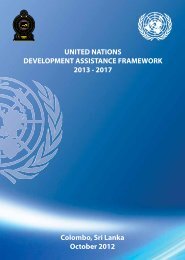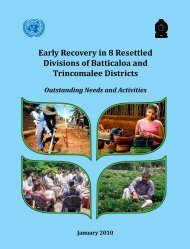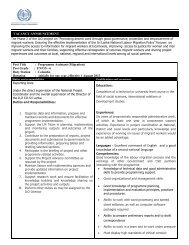Sri Lanka Human Development Report 2012.pdf
Sri Lanka Human Development Report 2012.pdf
Sri Lanka Human Development Report 2012.pdf
You also want an ePaper? Increase the reach of your titles
YUMPU automatically turns print PDFs into web optimized ePapers that Google loves.
at the local government level were further centralized,<br />
but accompanied by a revenue-sharing mechanism. The<br />
Provincial Business Turnover Tax levied by local authorities<br />
on all enterprises in their jurisdiction was removed, but<br />
one-third of revenue collected from the Nation Building<br />
Tax, the entirety of stamp duty collection and 70 percent<br />
of the motor vehicle registration fee were credited to the<br />
revenue account of the provincial councils. 314 It is too early<br />
to gauge the impact of this reformed tax regime, but it is<br />
unlikely to make the provinces fiscally stronger as, given<br />
limited economic activity, revenue collection of provinces<br />
outside the Western province is likely to be small.<br />
In general, the devolution of powers from the center to the<br />
provinces continues, but it has been accompanied by the<br />
continued dependence of provincial governments upon<br />
the central Government for finance. Unfortunately, the<br />
centre’s funding ability was constrained by the prolonged<br />
conflict and the corresponding need to beef up security<br />
expenditure. These pressures produced high central budget<br />
deficits. Liquidity shortages in turn have impeded the<br />
work of the provincial councils and further undermined<br />
public perception of them. 315<br />
A 2010 evaluation of the performance of devolved<br />
government in <strong>Sri</strong> <strong>Lanka</strong> noted: “Whereas local<br />
government should have deepened devolution, local<br />
authorities have got entrapped in increasingly centralized<br />
fiscal and administrative arrangements.” 316 In an important<br />
sense, then, devolution has narrowed provincial fiscal<br />
space and the ability of provinces to create a businessfriendly<br />
environment. The heavy dependence on the<br />
central government amounts to a containment of the<br />
private sector, which in turn constrains poverty reduction<br />
and human development.<br />
The precarious fiscal position of the provinces has led<br />
to a debate about whether devolution of powers as per<br />
the 13th Amendment and the creation of provincial<br />
governments have worked effectively for <strong>Sri</strong> <strong>Lanka</strong>. There<br />
are questions about lack of coordination between central<br />
and provincial governments over the provision of public<br />
services; often functions are not clearly demarcated, which<br />
leads to overlap and/or inconsistencies. 317 Several reports<br />
have noted significant shortfalls in the government<br />
structure and highlighted elements to strengthen for<br />
provincial authorities to perform well. The Institute of<br />
Policy Studies of <strong>Sri</strong> <strong>Lanka</strong> argues that the present system<br />
of fiscal decentralization is “beset with institutional and<br />
financial constraints...it is neither a purely administrative<br />
and decentralized system nor a fully devolved system of<br />
government.” 318<br />
No significant change in the present structure of<br />
decentralized government is likely to take place soon.<br />
To make better use of the existing structure, <strong>Sri</strong> <strong>Lanka</strong><br />
could at least undertake a legal, functional, fiscal and<br />
administrative review of local government. Such a study<br />
would identify weaknesses and strengths, what needs to be<br />
strengthened and why, and how to get local government<br />
to work effectively within the limits it faces. The study<br />
could also identify which services should be provided by<br />
devolved bodies and the centre, respectively. The Institute<br />
of Constitutional Studies pointed out: “…the Provincial<br />
Public Administration has matured enough to take up the<br />
task of regional development within the unitary polity of<br />
<strong>Sri</strong> <strong>Lanka</strong> utilizing powers devolved by the Constitution.<br />
The administrative systems of the Provinces have proved<br />
that given power, time, space and resources, they are<br />
able to deliver public services and undertake regional<br />
development improving local governance capabilities.” 319<br />
People’s Participation<br />
Often, states place less emphasis on engaging private<br />
stakeholders in governance, reform processes and public<br />
policy-making. It is more common for civil activists, the<br />
media and various interest groups to raise their voices.<br />
In general, democracy is deeper and richer if people and<br />
organizations from all quarters engage with each other<br />
and debate issues that affect them.<br />
That said, the onus is not only on the government. In<br />
<strong>Sri</strong> <strong>Lanka</strong>, stakeholders, particularly those from the private<br />
sector, could find strategic ways to actively interact with<br />
Chapter 6 Bridging Governance Gaps: State Capacity and People’s Participation 113






